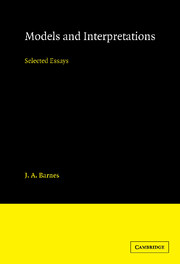Book contents
- Frontmatter
- Contents
- Preface
- Acknowledgments
- Introduction: social science in practice
- I MODELS OF THE REAL SOCIAL WORLD
- 1 Genetrix: genitor:: nature: culture? (1973g)
- 2 African models in the New Guinea highlands (1962a)
- 3 Agnatic taxonomies and stochastic variation (1971n)
- 4 Class and committees in a Norwegian island parish (1954a)
- 5 The righthand and lefthand kingdoms of God: a dilemma of Pietist politics (1971k)
- 6 Indigenous politics and colonial administration, with special reference to Australia (1960a)
- 7 The perception of history in a plural society: a study of an Ngoni group in Northern Rhodesia (1951c)
- II MODELS OF SOCIAL SCIENCE
- III A MODEL OF MODELLING
- Postscript: structural amnesia (1947: 52–3)
- Bibliography
- Index
5 - The righthand and lefthand kingdoms of God: a dilemma of Pietist politics (1971k)
Published online by Cambridge University Press: 08 January 2010
- Frontmatter
- Contents
- Preface
- Acknowledgments
- Introduction: social science in practice
- I MODELS OF THE REAL SOCIAL WORLD
- 1 Genetrix: genitor:: nature: culture? (1973g)
- 2 African models in the New Guinea highlands (1962a)
- 3 Agnatic taxonomies and stochastic variation (1971n)
- 4 Class and committees in a Norwegian island parish (1954a)
- 5 The righthand and lefthand kingdoms of God: a dilemma of Pietist politics (1971k)
- 6 Indigenous politics and colonial administration, with special reference to Australia (1960a)
- 7 The perception of history in a plural society: a study of an Ngoni group in Northern Rhodesia (1951c)
- II MODELS OF SOCIAL SCIENCE
- III A MODEL OF MODELLING
- Postscript: structural amnesia (1947: 52–3)
- Bibliography
- Index
Summary
This chapter was written as a contribution to a Festschrift for one of my teachers, Evans-Pritchard. He was the son of an Anglican priest and a convert to Roman Catholicism, as well as being the author of one of the mostimpressive works of social anthropology, Nuer religion (1956). The community I studied in Norway was deeply committed to Lutheran Pietism; a contribution dealing with some aspect of this faith seemed to be an appropriate choice for the Festschrift. Evans-Pritchard had stressed the close connexion between the social and economic life of the Nuer and their cosmological beliefs. I tried to do the same for the Norwegians of Bremnes, but with the causal arrow pointed firmly in the direction from religious beliefs to political activity. The somewhat unexpected selection of the leader of the only explicitly religious political party as Norwegian prime minister in a coalition government in 1965 conveniently brought into the limelight some of the complexities and contradictions inherent in a politico-religious stance that had served well for an embattled minority but which now had to be adapted for use in a position of power in the national arena.
Evans-Pritchard, perhaps because of his unorthodox, or at least unconventional, personal association with both Catholicism and Islam (cf. Lienhardt 1974: 303), left unresolved where, if anywhere, the boundary might be between theology and the sociology of religion (Barnes 1988b). In my paper I tried to incorporate relevant theological issues into what I hoped would be a fully sociological model of the nexus between religious belief and social action. […]
- Type
- Chapter
- Information
- Models and InterpretationsSelected Essays, pp. 88 - 102Publisher: Cambridge University PressPrint publication year: 1990



